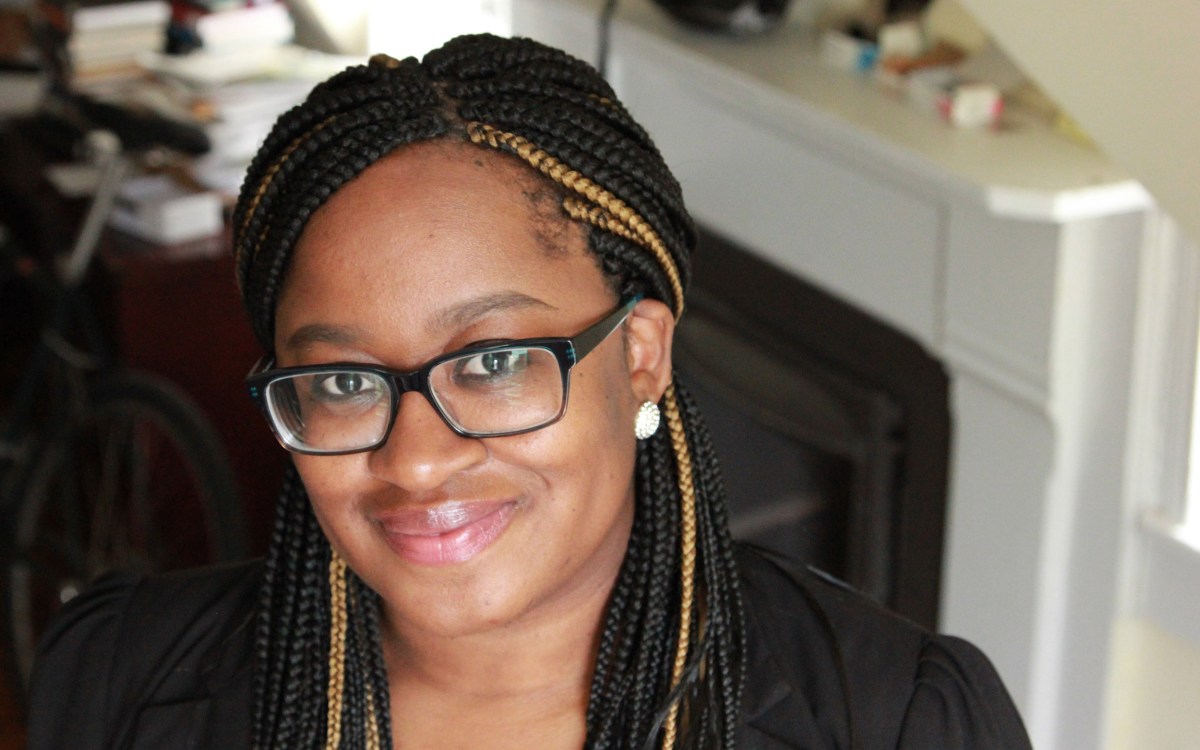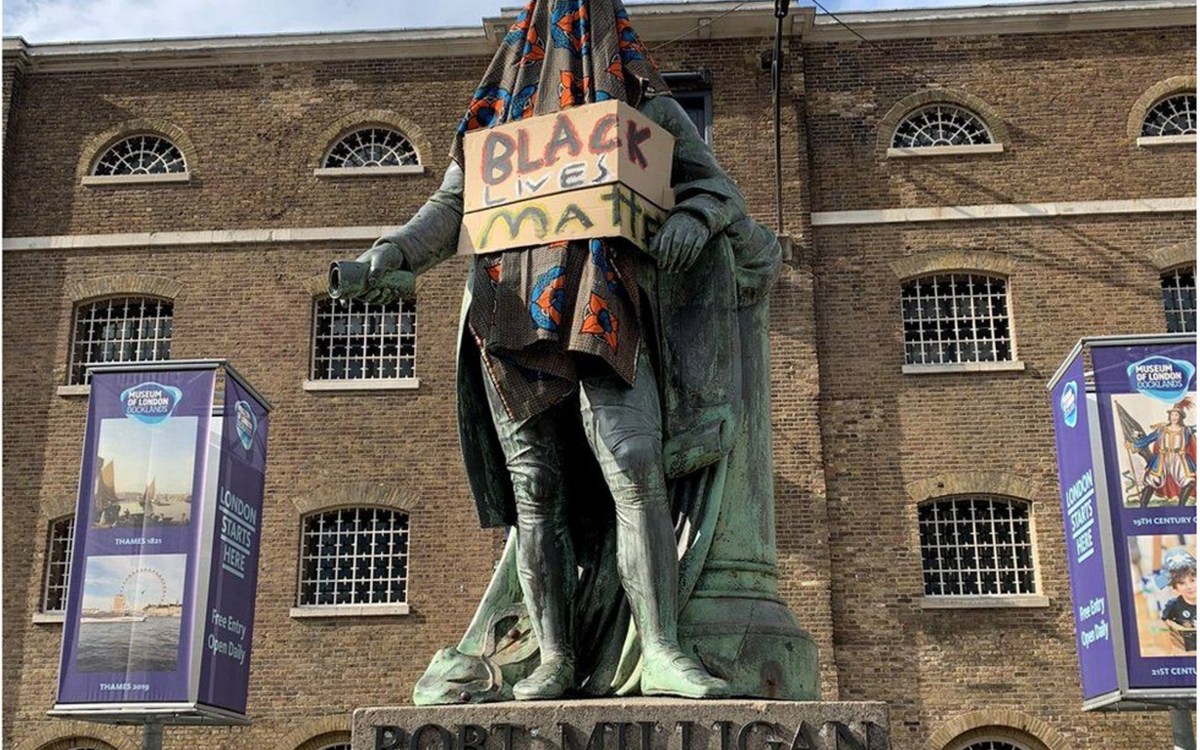Legacy of liberal violence
Caroline Elkins’ new history broadens story of British Empire, colonialism, she began in Pulitzer-winning, consequential ‘Imperial Reckoning’

Caroline Elkins’ new book delves deeper into the history of the British Empire and other forms of colonialism.
Rose Lincoln/Harvard Staff Photographer
“PAY UP FOR THE BRITISH GULAG IN KENYA,” one sign read. It was 2011, and four elderly Kikuyu — once Kenya’s largest ethnic group — stood in a cold, April sun beneath the soaring arches of London’s Royal Courts of Justice. The four were seeking the right to sue the British government over torture they had suffered during the Mau Mau revolt against colonial rule. The group was quiet, but their signs were loud: “JUSTICE NOW FOR THE MAU MAU VICTIMS OF TORTURE!”
The next year the High Court approved the legal action, which would eventually result in a settlement. The trial was historic. It put a colonial power on trial for its atrocities, highlighted the whitewashed mythology of liberal imperialism — and was launched in part by a book. The Pulitzer Prize-winning “Imperial Reckoning,” published in 2005, detailed the systematic torture and abuse British colonial agents used to suppress the 1950s Kenyan uprising.
“We inherit everything,” said Caroline Elkins, the author of “Imperial Reckoning” and a professor of history and of African and African American Studies in the Faculty of Arts and Sciences and of business administration at Harvard Business School. On March 29, Elkins returns with a follow-on, “Legacy of Violence: A History of the British Empire,” which was born during the final pages of “Reckoning.”
That project might’ve arrived a bit sooner, but the Mau Mau trial stalled her progress. The court case lasted four years and resulted in an unprecedented settlement of £20 million and an official apology from the British government to Kenyan victims. It also brought to light 300 boxes of undisclosed files from the British MI5 and MI6 archives. These papers validated the evidence Elkins presented in “Imperial Reckoning” — and came with an additional 8,000 files from 36 additional British colonies.
Elkins, who was allowed access to these archives, knew her work on the Kenyan insurrection “was part of a much bigger story,” one about England’s broader use of “legalized lawlessness” to justify violent suppression of colonized populations across its vast empire and later to destroy or obscure the evidence. What lingering effects, Elkins wondered, did these tactics have on today’s world? Put another way, what is the British Empire’s legacy of violence?
It’s grim.
The British Empire was the largest in history, occupying a quarter of the world’s land mass and more than 700 million people. In “Legacy of Violence,” Elkins crisscrossed 200 years and four continents to dig into the brutal tactics British colonists used to stop unrest. Moving from the 1919 Amritsar Massacre in India to Ireland’s War of Independence, Arab and Jewish uprisings in Palestine, and the Mau Mau uprising in Kenya, Elkins describes, often with graphic detail, atrocities committed in the name of liberal imperialism — Britain’s quest to bring civilization to what it considered backward races.
“All empires are violent,” Elkins wrote. And Britain’s was no exception. To keep colonies in check, they used torture, rape, imprisonment without trial, censorship, destruction of houses and villages, bombings, and starvation of civilians in concentration camps.
“Some may look at this and feel as though it’s too much,” Elkins said of her graphic descriptions. “I don’t want readers to feel like they just came away with a bunch of statistics. I want them to feel the lived experiences.”
Critics of “Imperial Reckoning” argued that, while the British Empire made some mistakes, it also brought education, health care, and the rule of law to its colonies. Elkins doesn’t disagree. “We see mortality rates come down with the introduction of various public health measures,” she said. But she sees little value in arguing about whether the empire was a force of good or evil. Instead, she likens it to Dr. Jekyll and Mr. Hyde — a warring, paradoxical combination of both.
“I hope the book will move readers away from thinking about things too reductively and start a new conversation that’s far richer and gets to the nuances of how and why things were happening the way they did,” Elkins said. “There are many legacies. We have to put it all on the table.”
But before that could happen, Elkins said, bright light needed to be trained on the gauzy narrative of the success surrounding the Empire’s civilizing mission. “I’m trying to challenge these recent historiographical and particularly political defenses of British exceptionalism,” she said, “to puncture the myths of paternalism and progress and demonstrate liberalism’s perfidiousness across the Empire and at home.”
So, what is the legacy of so much violence? The historian is more comfortable presenting evidence than conclusions. But, she said, there are remnants of the old impulses present today in unspoken assumptions that former enslaved and colonized populations will evolve through coercion and reform. This can be seen in, for example, mass incarceration. “Somehow, we can understand and rationalize violence alongside a very progressive liberal framework of developmentalism,” Elkins said. “For those populations considered ‘not yet’ evolved, the ‘yet’ is elusive, at least in the eyes of some of those holding the keys to power. It’s rather astonishing when you think about it.”
Elkins doesn’t begin “Legacy of Violence” with history, but instead on a recent social justice trend: the toppling or defacement of statues honoring white men, like Winston Churchill, who symbolize racism or oppression. Those who oppose tearing down these statues often argue that important parts of the country’s history or heritage might be lost.
“I don’t think taking down statues distorts history,” Elkins said. “But burning or hiding documents — that surely distorts our understandings of the past.”







